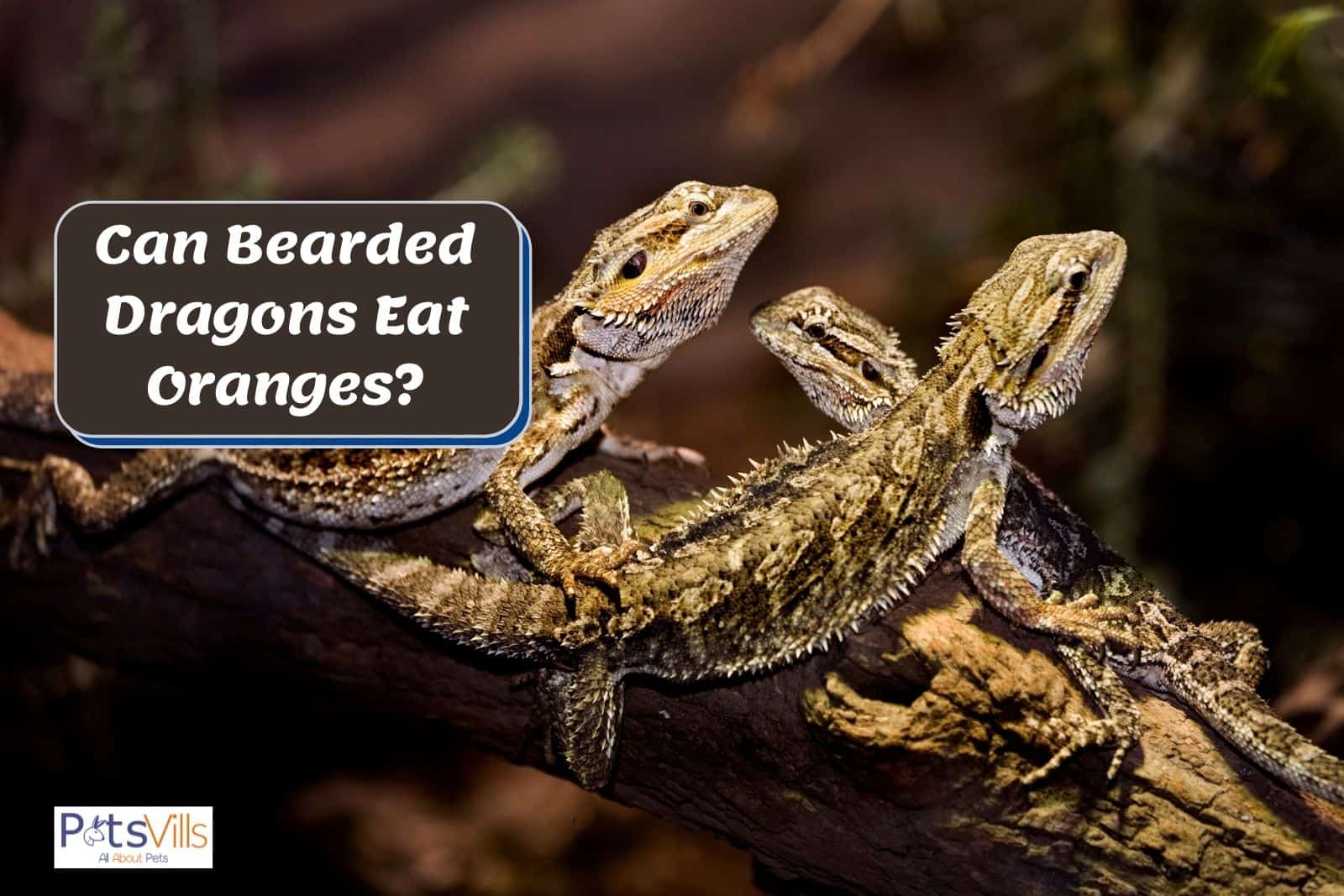Can bearded dragons eat oranges?
They seem like something that would be a great part of their diet since they’re so good for us, right?
However, just because WE can safely eat something doesn’t mean the same is true for our reptile pals.
Read on to find out if oranges are safe or toxic to beardies.
This post contains affiliate links. We earn a commission if you make a purchase after clicking on our links.
Don’t have time? Check this comparison table of our top faves!
Table of Contents
Do Bearded Dragons Eat Oranges?

Short answer: yes…but also no, bearded dragons can not eat oranges.
On the one hand, oranges aren’t toxic to beardies, and they do enjoy them.
On the other, though, oranges have very few benefits and numerous drawbacks.
If pressed to choose a definitive “yes” or “no” answer, I’d definitely go with “no.” Let’s discuss why.
READ MORE: Can Bearded Dragons Eat Cherries?
Why Can’t Bearded Dragons Eat Oranges?
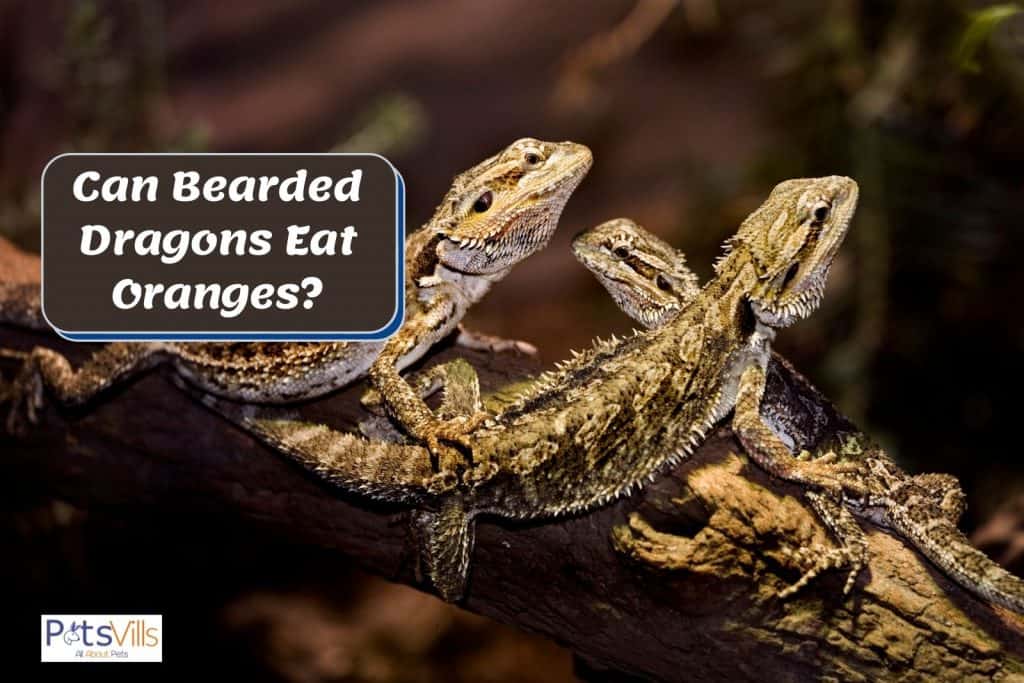
Beardies should not eat oranges because of the high sugar levels, acetic acid, water content, and fruit acids.
Let’s break each of these down and learn more about what makes them so bad for beardies.
1. High Sugar Content
High sugar content is why a “yes” and “no” is our answer to questions like; can a bearded dragon eat watermelon, oranges, strawberries, and other sweet fruits.
Too much sugar is very harmful to this reptile for a few reasons. First, it increases the risk of your beardie developing diarrhea and other health issues.
During the period of diarrhea, your pet’s digestive system won’t absorb nutrients from any food they eat. Also, diarrhea ultimately leads to dehydration.
Other conditions that can erupt from excessive sugar content in your bearded dragon’s body include obesity, bone infection, stomach upsets, heart failure, diabetes, digestive issues, fatty liver disease.
2. Oxalic Acid
Oranges also contain a high quantity of oxalic acid. Trace amounts of oxalic acid are safe for this reptile but the oxalic content in organs is too high.
Oxalic acids combine with the calcium in oranges to form calcium oxalate. This compound affects the calcium level in your pet’s body and reduces the absorption of calcium.
Ultimately there’s an increased risk of your beardie developing metabolic bone disease because of calcium oxalate compound.
This disease can cause paralysis, soft limbs, and deformities in the skeletal structure of your bearded dragon.
3. Citric acids
Like the high sugar content, acids from citrus fruit can impact your beardie’s digestive system. This, in turn, causes diarrhea and ultimately dehydration by irritating the stomach lining.
The truth is this reptile is a desert animal and can cope with some dehydration. Dehydration caused by feeding them oranges is far different and nothing like you have ever seen.
Your bearded dragon’s health will slowly deteriorate if dehydration and diarrhea persist.
Can Bearded Dragons Eat Mandarin Oranges?
Mandarin oranges are not quite like regular oranges. They actually have great calcium to phosphorus ratio and vitamin c among other nutrients.
Sadly, this doesn’t still make them healthy for your pet. You still have to gamble your beardie’s health against high sugar content, oxalic acid, and citrus acids.
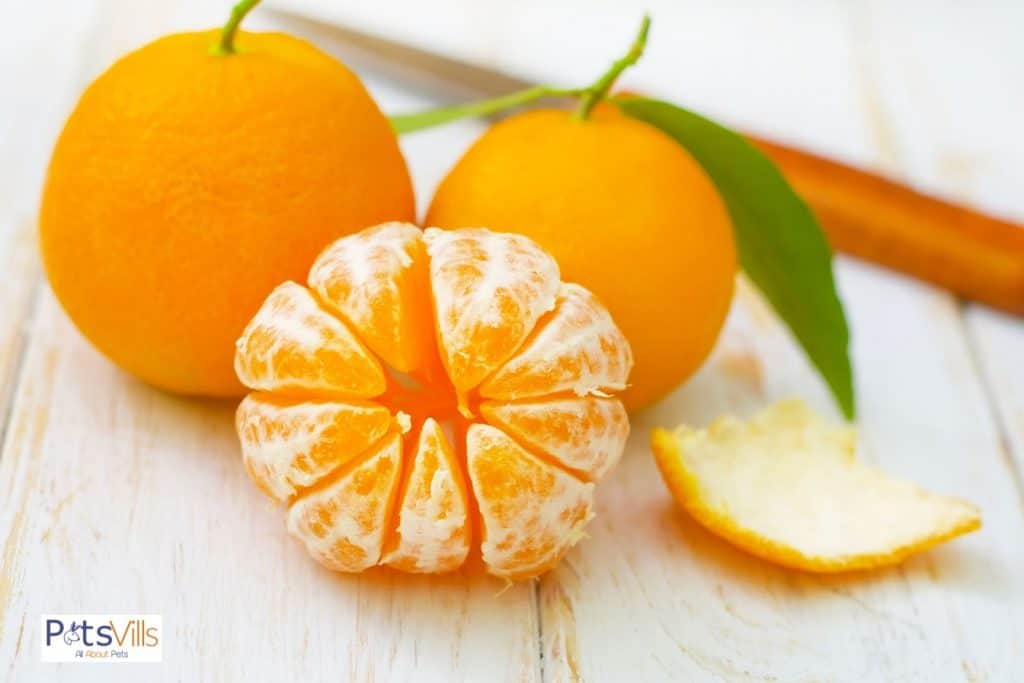
Mandarin oranges do have a lower acid level compared to oranges.
Nevertheless, its lower content is still toxic for this reptile’s health. If you feed your bearded dragon mandarin oranges, you do it at your risk.
Maybe you’ve seen conflicting info on this. It’s true that a few resources say that mandarin oranges are good for your beardie because of the calcium.
So, why are we disagreeing?
They make their assertions solely based on the fact that the calcium to phosphorus ratio in mandarin oranges is beneficial to your pet.
This doesn’t change the fact that mandarin orange has a higher sugar content, and its lower fruit acid is still toxic for your bearded dragon.
Simply put, there are just better and healthier ways to get your beardie the calcium he needs. The cons definitely outweigh the pros here.
Feeder Insects That Eat Oranges, Safe Or Not?
Beardies feed on several insects that consume oranges. These insects include Dubai roaches, discoid roaches, lobster roaches, and crickets.
Does this mean they pose a threat to your pet? No, they do not.
Feeder insects have more tolerance for the content of oranges.
These insects derive lots of calcium from oranges; the citric acid is broken down into smaller, less toxic substances. You can feed these reptile feeder insects irrespective of whether they feed on oranges or not.
Nevertheless, if you have the feeder insects under your watch and care, ensure that you do not feed them oranges more than once or twice a week.
This is just good enough for your bearded dragon. Any consumption of oranges that exceed twice per week would make the feeder insects too acidic for your beardie.
Are Oranges Good For Bearded Dragons?
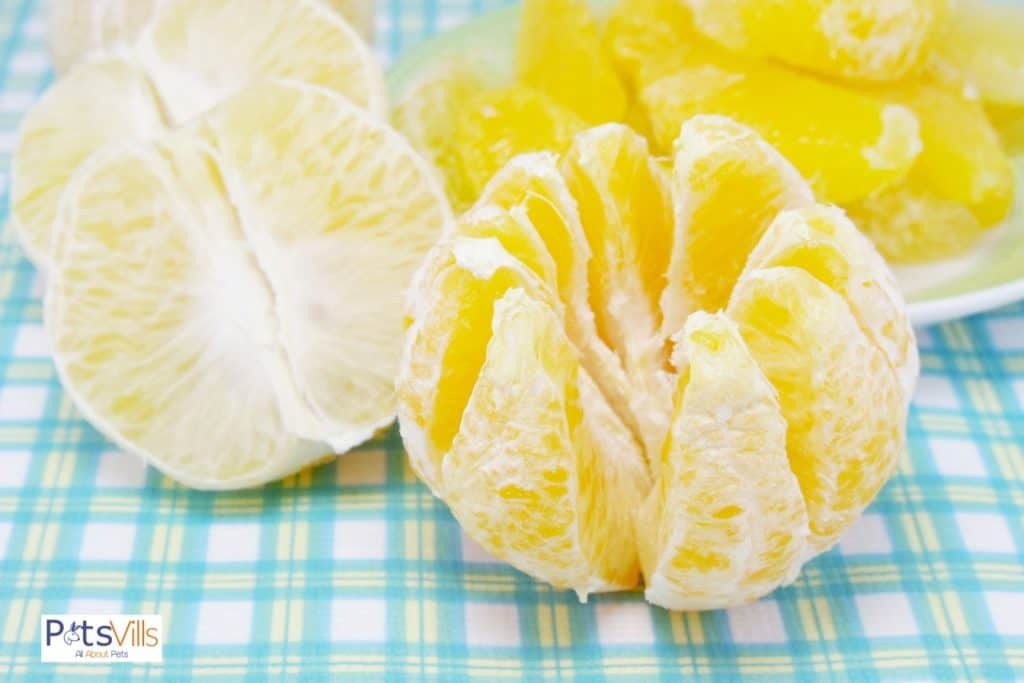
As we’ve seen, no, they’re really not. The increased risk of diarrhea is just too worrisome to outweigh any benefits.
Did you know that beardies are very prone to developing pinworms in their digestive tract?
Suppose the orange you serve them causes diarrhea.
Then the number of pinworms increases, and this means possible severe diarrhea.
Continuous diarrhea is bad enough for your pet, but the feces during a bout of diarrhea contain pinworms as well.
This not only puts your beardie at risk for reinfection but also endangers other beardies in the same habitat. It may even endanger you.
In light of this information, we recommend that you do not feed your beardie oranges.
If you decide to, make sure you serve them tiny portions. Nevertheless, you do this at your own risk.
READ MORE: Can Bearded Dragons Have Kiwi?
Can Bearded Dragons Eat Orange Peels?
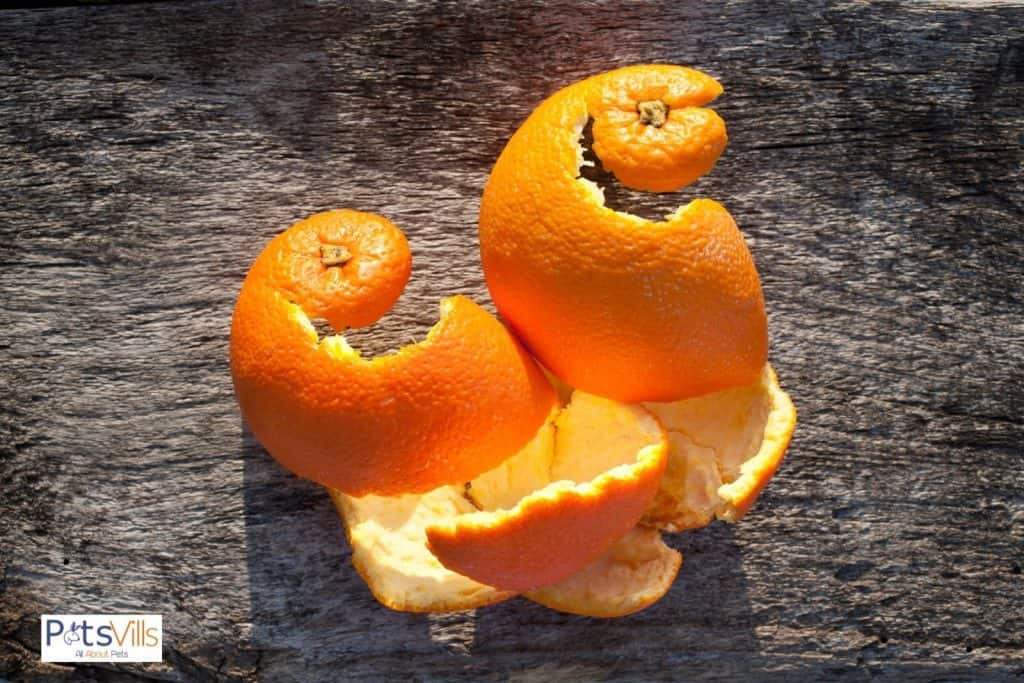
No. First, orange peels don’t have the texture that makes it easy for your beardie to consume them.
Second, they are highly acidic, and this is dangerous for your bearded dragon’s health. Orange peels contain lots of oxalic acids and orange oils.
Orange peels are indeed rich in calcium. However, there’s a good chance they’re covered in herbicides, pesticides and other chemicals. All of these can be fatal to your beardie.
Collard greens, turnip greens, beet greens, leafy greens, alfalfa plant, Chinese cabbage, dandelion greens, green cabbage, green beans, cuttlefish bone and calcium supplements are better food source.
Can Bearded Dragons Eat Orange Juice?

No. We’ve already established that oranges are not the best choice of fruits to serve this reptile.
Orange juice isn’t any different from an orange. It has more water, high sugar content, and fruit acids.
Navel Oranges or Blood Oranges, Yea or Nay?
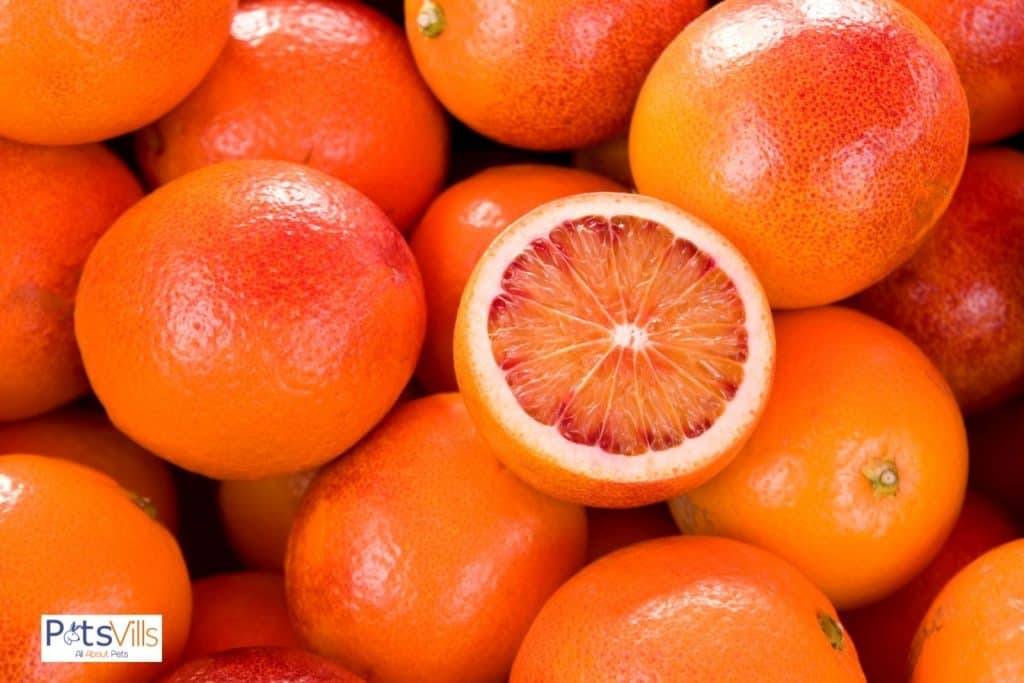
Can bearded dragons eat blood oranges? Neither navel oranges nor blood oranges are not good for your pet.
Often people recommend navel oranges or mandarin oranges for this reptile because they are rich in calcium.
Most citrus fruits contain sugar and fruit acids in quantities that are dangerous for your beardie. 100g of blood orange has a whopping 12g of sugar.
Other Fruits Safe For Your Bearded Dragons
Pet owners have questions like: can bearded dragons eat blueberries? Fruits usually contain lots of sugars and are low on the essential nutrients required by your beardies.
Nevertheless, vet doctors recommend these are fruits bearded dragons can eat. They include; strawberries, dates, raspberries, figs, and apricots.
The following fruits are also recommended as salad toppings; apples, figs, mango, papaya, and cantaloupe. Each of these fruits contains the essential nutrients required by this reptile for growth and development.
To help you prepare the right bearded dragon diet, check our e-book with a complete feeding guide:
FAQs
What happens if you feed a bearded dragon oranges?

If they get a small bite, they should be fine. However, oranges have too much sugar and can cause diarrhea. Small pieces also pose a choking hazard. It’s best to avoid feeding beardies oranges entirely.
Can bearded dragons live off of just fruit and vegetables?
No. Adult bearded dragons mostly eat fruits and veggies, but they still need some protein (about 25% of their diet). Baby bearded dragons absolutely cannot live off just fruits and vegetables, as 75% of their diet should come from protein sources.
Are any oranges good for your beardie?
Not really. While not toxic, all oranges- from regular to mandarins to blood oranges- are too high in sugar.
Conclusion
While they’re not toxic, oranges (like most citric fruit) are not really good for your pet. Beardies are variety eaters, and there are many safe foods you can feed them.
References
- “Bearded Dragon Diarrhea: How, When, and Why?” 2020. Vet Explains Pets. October 6, 2020. https://vetexplainspets.com/bearded-dragon-diarrhea/#:~:text=Coccidiosis%2C%20or%20an%20infestation%20of%20the%20coccidia%20%28a,their%20healthy%20immune%20system%20keeps%20everything%20in%20check..
- “Bearded Dragons – Diseases.” 2021. Vca_corporate. 2021. https://vcahospitals.com/know-your-pet/bearded-dragons-diseases.
- “FoodData Central.” 2021. Usda.gov. 2021. https://fdc.nal.usda.gov/fdc-app.html#/food-details/169105/nutrients.
- Gardiner, John. 2019. “Bearded Dragon Care.” Animal Health Topics / School of Veterinary Medicine. April 12, 2019. https://healthtopics.vetmed.ucdavis.edu/health-topics/exotics/bearded-dragon-care.
- PetMD Editorial. 2008. “Reptile Parasites & Worms in Reptiles.” Petmd.com. PetMD. September 4, 2008. https://www.petmd.com/reptile/conditions/digestive/c_rp_worms.
- WebMD Editorial Contributors. 2020. “Health Benefits of Blood Oranges.” WebMD. WebMD. September 2, 2020. https://www.webmd.com/diet/health-benefits-blood-oranges#1.
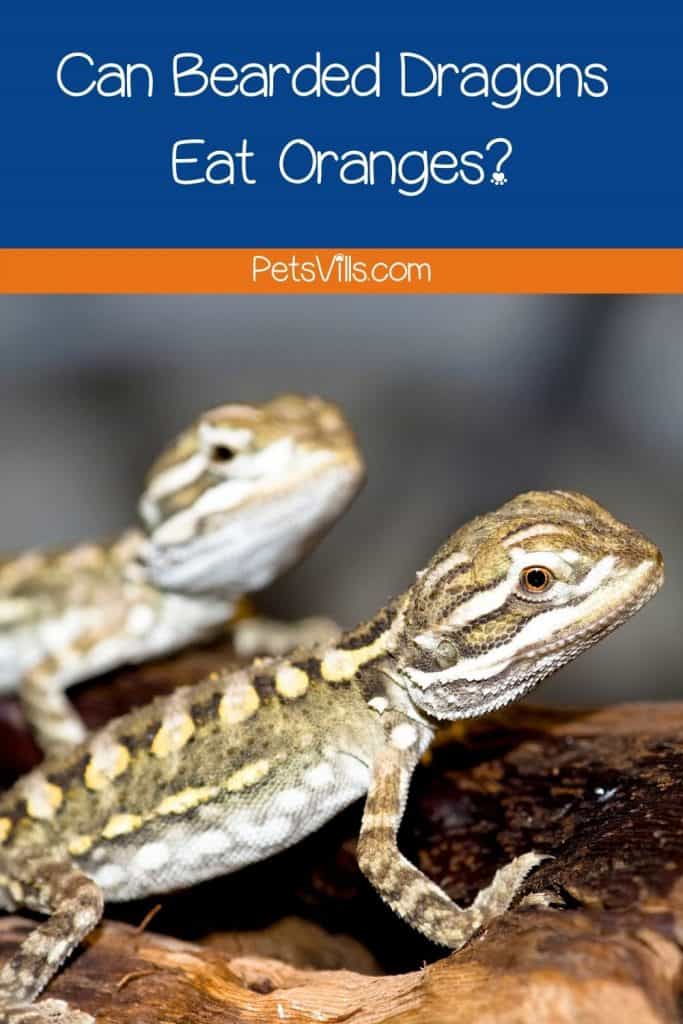
Do bearded dragons eat oranges? Have you tried feeding oranges to your beardie? We’d love to hear your experiences below!
Alina Hartley is a small-town girl with a ginormous love of bearded dragons. It all started with Winchester, a baby bearded who was abandoned at the shelter by his former owners because of a birth defect that caused one front leg to be shorter than the other. Alina originally went to the shelter looking for a guinea pig, but one look at Winchester and it was love at first sight. From that day on, Alina has dedicated her life to learning everything she can about bearded dragons. She loves helping new beardie parents start their incredible journey with these magnificent reptiles.
Follow her on:
LINKEDIN
TWITTER.
Read her latest articles HERE
Learn more about her HERE.

